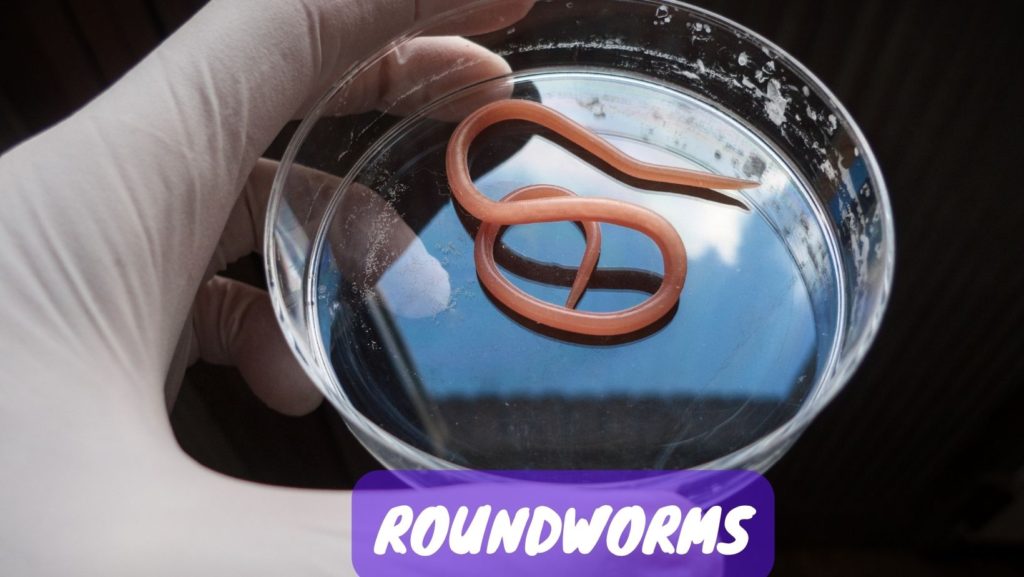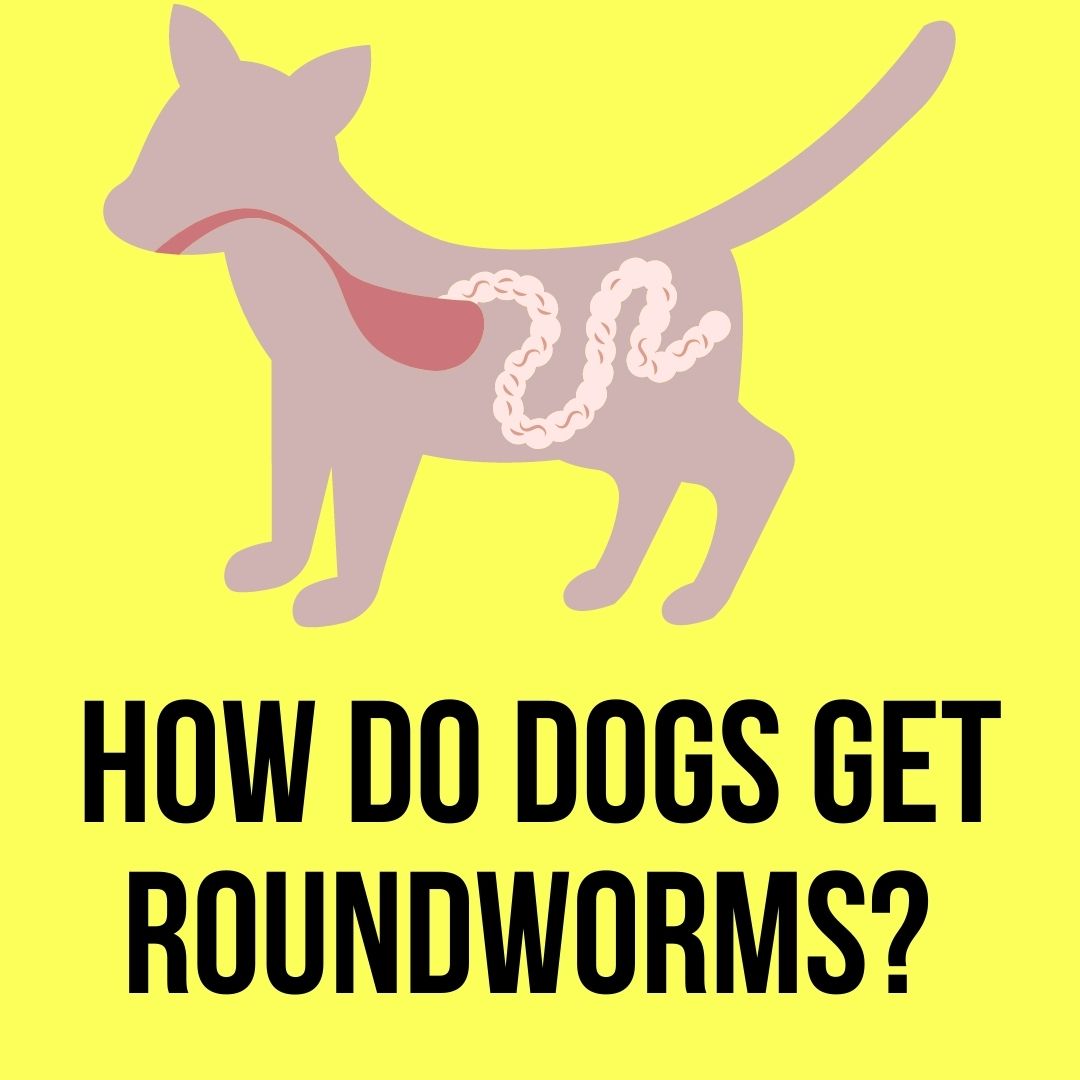Wondering where your indoor dog gets Roundworm infection from? Well, you might find the correct answer with us.
Several infectious agents can infect dogs during their lifetime, and Roundworms are one of them.
This unholy group also contains Hookworms and Whipworms as one of the most common infectious agents.
Although routine deworming can help with such parasitical infections, there is a lot more you must know and practice.
Contents
- How did my dog get Roundworms?
- Roundworms in Dogs – Symptoms, Causes, Treatments
- Roundworms in Dogs- 6 Facts and Reasons
- Do dogs poop out Roundworms?
- Where do Roundworms come from?
- How much does it cost to treat Roundworms?
- Can I get Roundworms from my dog licking me?
- How likely is it to get roundworms from a dog?
- Can I touch my puppy if he has roundworms?
- Can a dog fully recover from Roundworms?
- How do you know when Dog roundworms are gone?
- Will Roundworms Kill a Dog?
- How long do dogs live after roundworm treatment?
- Should I adopt a Roundworm positive dog?
- Wrapping up…
How did my dog get Roundworms?
If your dog recently got a Roundworm infection, chances are he/she ate/sniffed/licked the infected feces of another dog or cat.
Roundworm infection spreads through eggs in the feces of any suffering animal.
These animals can range from dogs, cats, birds, cockroaches, rodents, and earthworms.
Roundworms in Dogs – Symptoms, Causes, Treatments
Roundworms, also known as ascarids or nematodes, are common intestinal parasites that attack dogs.
These worms live freely inside the dog’s intestine and feed off of their partially digested food.
The name Roundworm comes from the round/ tubular shape of worms.
The two important species of roundworms found in dogs include Toxocaracanis and Toxascaris leonine.
The former is worse and can even spread across (from dogs) to humans.

Roundworm Symptoms in Dogs
- Potbelly appearance.
- Prolonged Weakness
- Diarrhea
- Vomiting
- Pain in abdomen
- Dull coat
- Weight loss
- Loss of appetite/ Increased appetite.
- Malnourishment
- Worms in vomit
Roundworms in Dogs- Causes
Roundworms are common amongst dogs, especially puppies. The canines might get roundworms from:
- As puppies while feeding on their mother’s milk. It only happens if the mother dog is infected with a roundworm infection.
- From eating, licking, or sniffing an infected animal’s stool (containing roundworm eggs).
- By eating mice or other small animals that are infected.
Roundworm diagnosis in Dogs
The standard and easiest diagnosis for roundworm infection in dogs are through a sample of their stool.
The responsible Vet will take your dog’s poop, mix it with some solution and examine it under a microscope.
Roundworm treatment in Dogs
Treating roundworm infections in dogs is very straightforward. Once your dog is diagnosed with a roundworm infection, your Vet will suggest you some medicines.
These medicines most likely may include fenbendazole and pyrantel or milbemycin as dewormers. Piperazine and pyrantel, too, are some of the effective deworming medications for treating roundworm infection in dogs.
Depending upon the severity of the infection, Vet will prescribe one to three doses of dewormer for the dog. Follow-up doses after another diagnosis might be required.
Roundworms in Dogs- 6 Facts and Reasons
- Most dogs suffer from roundworm infection at least once in their lifetime.
- Puppies can catch roundworm infection right during birth if the mother dog is infected.
- Humans, especially children, and pregnant women are at more risk of catching an infection.
- Roundworms inhabit the inside intestine or gastrointestinal (GI) tract of dogs.
- Roundworms transfer through worm larvae or eggs from dog to dog, cat, or humans.
- Preventive dewormers can save dogs from roundworm infection.
Do dogs poop out Roundworms?
It is less likely for dogs to poop out roundworms. Instead, dogs suffering from a roundworm infection can poop worm eggs.
However, there are chances that the suffering dog may release some roundworms through vomiting.
It happens majorly when the dog suffers from a severe worm infection case.
Where do Roundworms come from?
Like any other parasitical worm, Roundworms can live in the environment for years. Not just the worm form, but even their eggs can survive for long.
Roundworms often come from sand, soil, or plants that once were contaminated by infected animal feces.
When an animal or human accidentally swallows such things, the chances of consuming worm eggs also become prominent.
How much does it cost to treat Roundworms?
The cost of treating roundworm infection can range from low to high. The overall cost dramatically depends upon the dog’s age and size, the area you stay at, and the level of infection.
The procedure will begin with a fecal test that will cost somewhere around $30 to $120. For dogs who have an infection, the Vet will suggest some deworming drug costing from $20 to $200.
The severity of the infection will require another round of medicine, adding more to the cost. Once the treatment is done, and the dog has recovered, another fecal test for satisfaction is recommended. The overall cost can range from $80 to $400.
Can I get Roundworms from my dog licking me?
Pet parents usually don’t bother much when their dog licks them; however, it isn’t as safe as it appears.
Worms, including Roundworm and Hookworms, can spread from dogs to humans through licking. Since your dog’s mouth may contain roundworm larvae/ eggs, it may happen.
Licking can also spread the Giardia parasite from dogs to humans. That is why, despite how much you love your dog, always maintain some hygiene while they are suffering from a worm infection.
Also, ensure your dog isn’t poking his face on shit and coming back home licking you out of love.
This, in the first place, is gross, and secondly can lead to you catching multiple infections and skin problems.
How likely is it to get roundworms from a dog?
Dogs cannot directly pass roundworms to humans, but it is more likely that you can catch this infection anyway.
Accidental contact with dog feces or contaminated soil can result in the ingestion of roundworm larvae in humans.
This, within a few weeks, will develop a roundworm infection inside your system.
A roundworm infection can lead to the human eye, lung, heart, and neurologic issues.
Can I touch my puppy if he has roundworms?
Yes, as a pet parent, you can definitely touch your puppy if he is suffering from a roundworm infection.
However, make sure you wash your hands with soap every time after touching your dog.
Also, ensure cleaning infected dogs’ poop as soon as possible. The idea is to clean it before it dries and scatters into the environment.
And since worm eggs can live for long in dog poop or soil, dispose of them far away from your garden.
Can a dog fully recover from Roundworms?
Yes, Roundworm infection isn’t incurable, and dogs can fully recover from it. Multiple safe and effective medicines kill adult roundworms in the intestine.
Vets can even suggest monthly dewormers that are effective for saving the pet from any future infection.
However, medication does not kill the eggs of the Roundworm.
Thus, dogs may need to be treated one to three times to get rid of the newly hatched worms or adult eggs.
While these doses are missed, chances are roundworm eggs may survive inside your dog’s intestine.
How do you know when Dog roundworms are gone?
Once you stop seeing worms out from your dog’s poop, it means he is recovering.
Improvement in symptoms of Roundworm also indicates that the canine is or has completely healed.
However, to make sure, getting a stool test is safe and advisable.
Will Roundworms Kill a Dog?
Though roundworm infection is curable, it may prove fatal for dogs if untreated.
It is crucial to figure out the symptoms of roundworm infection in dogs during an early stage.
It is when the parasites won’t have led to much harm.
However, once the infection becomes severe, it can lead to poor growth amongst canines and even death in some cases.
How long do dogs live after roundworm treatment?
Dogs can live a healthy and long life after roundworm treatment. Roundworm infection isn’t excruciating and generally doesn’t put much harm.
That is why a dog’s growth or lifespan doesn’t impact after its treatment.
However, if left untreated, the infection can hamper the dog’s development and even result in death.
Should I adopt a Roundworm positive dog?
There is no harm in adopting a roundworm-positive dog as long as you can dedicate care to them.
Dogs shelters these days have multiple dogs suffering from Roundworm or other parasitical infections.
It happens due to less space and more dogs in individual shelters.
While you are adopting a dog from a shelter or care center, the chances of them carrying an infection are prominent.
Individuals who can dedicate time, efforts, and resources to treating roundworm-positive dogs must go forwards for adoption.
- You May Also Like To Read
- How Do Dogs Get Pinworms
- How Do Dogs Get Heartworms
- Ways To Deworm a Cat or Dog at Home?
- How Do Dogs Get Tapeworms
- How Do Dogs Get Hookworms
Wrapping up…
This was all about Roundworms in dogs, where they get from, and their treatment.
Roundworms spread quickly; thus, having an eye on where your dog pokes its face is very important.
Any movement when you are skeptical or concerned about roundworm infection in your dog, talk to your Vet soon.
An early diagnosis and treatment will make the canine suffer less.
